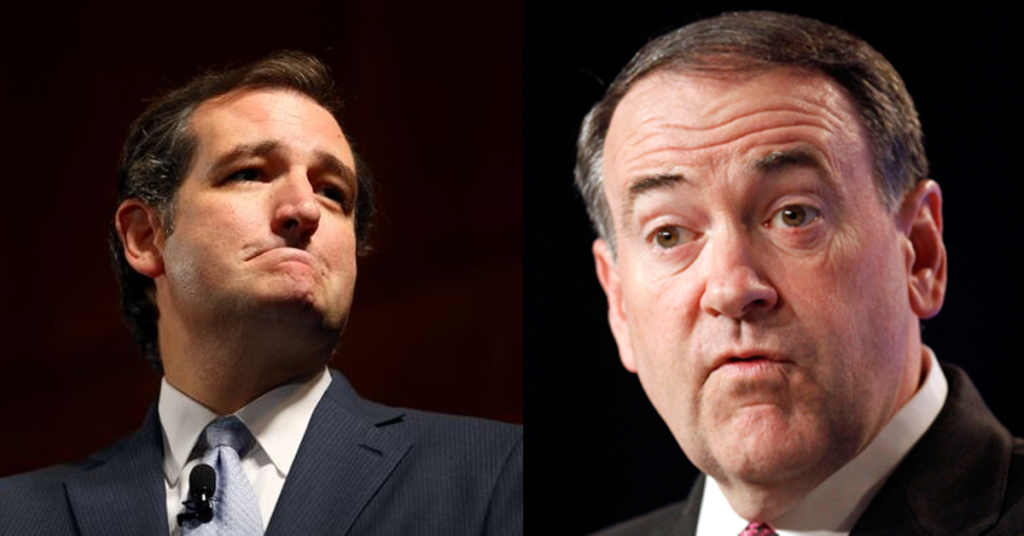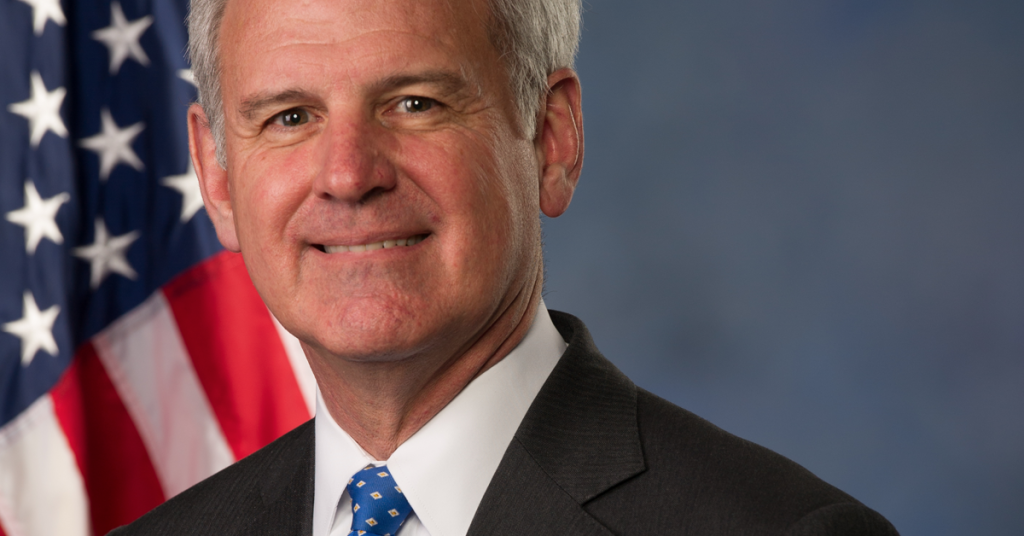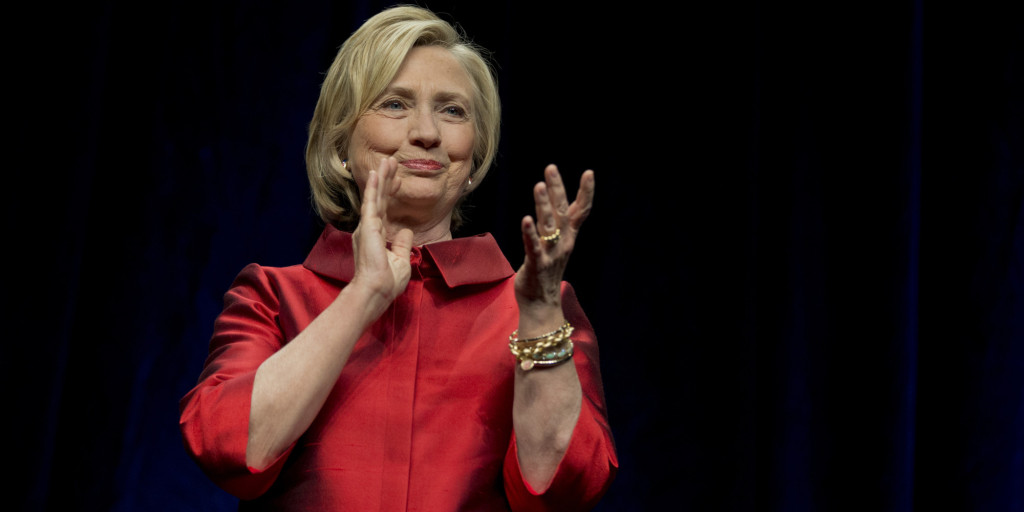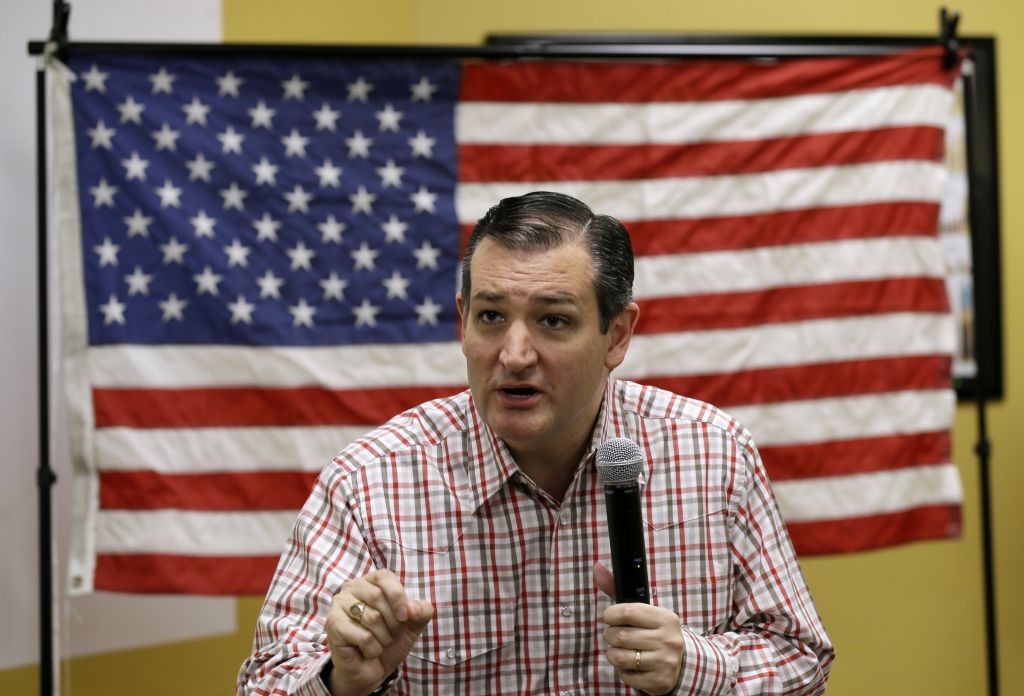Ted Cruz, Mike Huckabee go head-to-head for evangelical votes

Republican presidential candidates Ted Cruz and Mike Huckabee went head-to-head for evangelical votes Sunday, telling a megachurch congregation in Georgia that God favors the United States but warning that the nation is on a perilous spiritual path because of actions like the Supreme Court decision legalizing same-sex marriage in all 50 states. Huckabee, who enjoyed evangelical support on his way to winning eight states in his 2008 White House bid, called the ruling “radical” and “illegal.” “I want to serve notice that the Supreme Court is just the supreme of the court system that is one of the three equal branches of government,” Huckabee told hundreds of members of Rock Springs Church in a rural area outside metro Atlanta. “It is not the supreme branch, and it most certainly is not the supreme being.” Cruz, the Texas senator, said a five-justice majority “ignored the text of the Constitution” and said the cascade of judicial and public support for same-sex marriage threatens religious liberty in America. He said he hopes the ruling “serves as a spark, to start a fire that becomes a raging inferno as the body of Christ stands up to defend the values that have built America.” Their appearance about 50 miles south of downtown Atlanta is part of the early, concerted scramble for the conservative evangelicals who remain an important bloc of the GOP presidential electorate. Christian conservatives have long held considerable influence in Iowa, which hosts the first caucus of the primary season, and in South Carolina, home of the South’s first primary a few weeks later. Now, Georgia and several other Southern states get more frequent visits from presidential hopefuls ahead of the planned “SEC primary,” named for the Southeastern Conference of college athletics. The March 1, 2016, vote falls after the traditional first four states and ahead of the usual “Super Tuesday” states. Huckabee, whose 2008 wins included Iowa and Georgia, has called the Southern-dominated primary date “manna from heaven.” But Cruz and others — Rick Santorum, Louisiana Gov. Bobby Jindal, retired neurosurgeon Ben Carson — are making hard runs for the same bloc of support. The Sunday event was a belated Independence Day observance that also featured The Charlie Daniels Band and Jep Robertson, one of the members of the cable television “Duck Dynasty” family. For Cruz and Huckabee, it might as well have been a county fair in Iowa, with an added opportunity to speak openly and passionately in their preferred evangelical tones. Cruz told the story of an Iowa couple he said were driven out of the wedding chapel business after denying their services to two men who wanted to get married. The case, Cruz said, “is emblematic of the persecution that religious liberty and believers across this country.” He continued: “I will always, always, always stand and defend the religious liberty of every American.” Huckabee said the Independence Day observances were an opportunity to reject “the revisionists” who say of the American founders: “They really were not believers.” The ordained Baptist minister argued: “There is simply no other explanation … God had to bless America or we would not exist. The question is will God continue to bless America without our repentance.” The Rev. Benny Tate, pastor of the 6,000-member Rock Springs congregation, joked about the attention. “Our zip code is E-I-E-I-O,” he said, “and we’ve got two presidential candidates. How about that?” But the minister is also a serious player in Republican politics, with many Georgia politicians, and now national ones, courting his public approval, if not his explicit endorsement. Tate told the assembly that Huckabee, as Arkansas governor, signed “a ban on partial-birth abortion,” referring to the termination of late-term pregnancies. He hailed Cruz for “standing against the Democratic Party … and even against the Republican Party.” Despite the emphasis on faith, Huckabee’s loudest applause came when he lauded his “fair tax” proposal that he said “would allow us to, once and for all, abolish the IRS.” Cruz, meanwhile, drew some of his most enthusiastic reactions when he declared, “I’m convinced 2016 will be a referendum on repealing Obamacare,” President Barack Obama‘s signature health care law. A few minutes earlier, the assembly passed offering plates for the church’s clinics, which Tate said provide “free health care” to residents in dozens of surrounding counties. Republished with permission of The Associated Press.
Bradley Byrne: Cutting regulations, lowering power bills

The summer months in southwest Alabama can be especially grueling with temperatures resting in the 90s. If your family is like mine, summer also means higher power bills. Well, those power bills might be getting even more expensive without anything to do with the weather. In the past few years the Environmental Protection Agency (EPA) has released a record number of regulations. They run the gambit from costly regulations on coal power plants to attempts to regulate mud puddles on family farms to policies changing what type of light bulbs Americans can use in their home. The new regulations aren’t cheap, and they will hit the wallets of working Americans. Studies found that the EPA’s attempt to regulate CO2 emissions from existing fossil-fuel power plants would cost more than $366 billion. Even worse, families in more than 40 states, including Alabama, would see their power bills rise by double digits. It doesn’t stop there. The EPA’s attempt to lower the ozone standard would result in the most expensive rule it has ever proposed. If put into effect, the National Association of Manufacturers contends, the regulation could slash family budgets by $830 per year, reduce our gross domestic product by $1.7 trillion, and cost our economy 1.4 million jobs. Being from along the Gulf Coast, we know how important it is have clean air and water, but I don’t think the American people need costly mandates and federal requirements in order to be good stewards of our land. We should always consider the effect such regulations would have on hardworking families and the budgets of small businesses. In Congress, I have made it a priority to focus on solutions that help lower the costs of energy and fight back against the activist EPA. A few weeks ago, the House passed H.R. 2402, the Ratepayer Protection Act. This common-sense legislation would allow states to opt-out of implementing the EPA’s rule on greenhouse gas emissions if they found the rule would have an adverse effect on families in their state. The House is also using the appropriations process to rein in the EPA. Since Republicans took control of the House in 2010, the EPA has been cut by about 15 percent, but I think we can make even more cuts. This year’s funding bill for the EPA, being debated in the House this week, is $1.17 billion less than President Obama requested. The funding bill also includes provisions to prevent the EPA from moving forward with many of its regulations. Analysts say that by halting these new regulations, our legislation will save nearly 300,000 jobs related to the energy sector. Our bill also rejects efforts to place more requirements and red tape on new energy projects. Congress and the legislative branch aren’t the only ones fighting back against the EPA’s overreach. A few weeks ago, the U.S. Supreme Court ruled against the EPA in a major court decision. In the ruling, the court said that the EPA has to consider the economic impact when issuing new regulations. It was a major victory for those of us who think regulations are holding back our economy. If we are to accomplish a true “all-of-the-above” approach to energy production, then we must stop senseless regulations and costly red tape. Affordable energy is a key component to turning our economy around and putting people back to work. That should be the ultimate focus of Congress, and that will remain my focus as I serve as your voice in Washington. Bradley Byrne is a member of the U.S. Congress representing Alabama’s 1st Congressional District.
Hillary Clinton reaches out (and out and out!) for 2016 policy ideas

Earlier this year, Hillary Rodham Clinton‘s campaign lost count of its experts. In the months before she began her second run for the White House, Clinton spent hours quizzing economists, lawyers, educators and activists about everything from executive compensation to the latest research on lead paint. By last fall, the number of experts she had interviewed hit two hundred and her team stopped keeping track. “It was like I hadn’t left Harvard,” Roland Fryer, an economist at the university, said of his meeting with Clinton to discuss successful charter school practices. “It was like talking to a colleague and debating over a cup of coffee.” The Democrat isn’t an incumbent, and even with competition that’s resolute but still far from offering a serious primary challenge, Clinton has a luxury few candidates enjoy: time to hit the books. The results have started to emerge, and Clinton plans to add to them by releasing a new domestic policy proposal nearly every week this summer. To be sure, politics are at play as Clinton shapes her agenda. She is sidestepping foreign affairs, which has consumed much of the early debate among Republican White House hopefuls eager to paint the former secretary of state with President Barack Obama‘s record on the world stage. She is not yet offering specifics on subjects where consensus among Democrats and independent voters will be harder to find: trade, limits on executive pay, regulating the country’s finance industry, raising the minimum wage to $15 an hour. What Clinton debuts in the coming weeks will form the core platform of her campaign and, should she win the nomination and the presidency, her administration. It’s an agenda Clinton describes as that of a “pragmatic progressive,” centered on families and focused on economic growth, innovation and income inequality. Already introduced: proposals for paid family leave, free community college, universal pre-kindergarten, lowering student debt and job retraining. Still to come: ideas about taxes, climate change, education, wages, Wall Street and business regulations, which she’s given the more politically palatable name of “corporate responsibility.” “There is genuine curiosity and interest in exploring all of this from Clinton and her team,” said Felicia Wong, head of the liberal Roosevelt Institute, who has urged Clinton to aggressively counter income inequality. “But the details will matter a lot.” Most especially to those who wanted Sen. Elizabeth Warren, D-Mass., to get into the race and are now packing town halls held by Vermont Sen. Bernie Sanders, an independent running for the Democratic nomination from Clinton’s left. Clinton’s challenge is to craft positions that will satisfy that grassroots segment of her party, but won’t also vilify the wealthy – particularly the donors she’ll need to pay for a campaign expected to cost $1 billion. So while Clinton consulted progressive champions, including Columbia University economist Joseph Stiglitz and New School labor economist Teresa Ghilarducci, she’s also talked with Democrats with close ties to Wall Street, such as former Treasury chiefs Robert Rubin and Larry Summers. It’s a reach-deep approach aimed in part at correcting mistakes made during Clinton’s 2008 campaign, which was criticized by some Democrats for being too insular. “In 2008, when we saw each other, she would ask me questions,” said Miami Dade College President Eduardo Patron, an education expert who first met the Clinton in 1980. “This time is more methodical, and that’s very intentional.” Aides began pulling together briefing books last year. Her campaign says work by Harvard University sociologist Robert Putnam, the author of a book on childhood poverty and the “opportunity gap,” and Brookings Institution fellow Isabel Sawhill, who studies the decline of marriage and income inequality, particularly influenced Clinton’s early thinking. Since then, Clinton’s research has continued in meetings, phone calls and emails with individual and larger groups of unpaid, informal advisers. Some have known the Clintons for decades, while others who are newer to the circle. Harvard Professor Raj Chetty, an expert on social mobility, guided Clinton through slides on research into how children in certain areas of the country are more likely than others to get ahead. Heather Boushey, president of the liberal Center for Equitable Growth, provided data on the economic impact of the growing number of female breadwinners. Those who have met with Clinton say she often questioned whether their policy ideas can be “scaled up” to a national level and also used the gatherings to run her own ideas past outside experts. “It was made clear that we weren’t just going to sit down for an hour,” said Katie Porter, a law professor at the University of California, Irvine, and expert in consumer bankruptcy. “We were going to think, refine our ideas and have more conversations.” The results of the research are evident in the campaign. While talking about race relations during a visit to an African-American church in Missouri last month, Clinton detailed the impact of lead paint poisoning on young children. A speech to a Latino organization in Las Vegas earlier this month featured data on how many words children hear by the age of three. At stops in New Hampshire, Clinton frequently mentions the average debt burden for students in the state. “She can wonk-out for hours,” said Neera Tanden, a former adviser who’s now helping craft campaign policy as president of the liberal-leaning think tank Center for American Progress. “She’s one of the few people who talking about policy can get her into the greatest of moods.” Republished with permission of The Associated Press.
Ted Cruz’s 2016 campaign says its raised more than $14M

Ted Cruz‘s presidential campaign has raised more than $14 million since the Texas senator launched his bid for the Republican presidential nomination just over three months ago, his campaign said Sunday. The money comes from more than 120,000 donors who made an average contribution of $81. Presidential candidates are required to report detailed fundraising figures though the end of June to the Federal Election Commission by mid-July, but Cruz is among a handful of contenders who have announced overall totals ahead of the disclosure date. Republican Ben Carson, a retired neurosurgeon and political novice, will report having raised $8.3 million for his presidential candidacy, his campaign said on Wednesday. On the Democratic side, front runner Hillary Rodham Clinton will report having raised $45 million. Cruz was the first major Republican to wade into the GOP primary, which will soon have 16 formally declared candidates. After his March 23 announcement at Liberty University in Virginia, his campaign raised just over $4 million in the final week of that month. Since then, he’s collected another $10 million, his campaign said. Cruz also transferred $250,000 from his Senate campaign to his presidential campaign, according to documents filed with the FEC. “The grassroots energy and support we are seeing is overwhelming,” Cruz said in a statement. Cruz also will benefit from several super PACs that are supporting him and can raise money without contribution limits. Those groups have previously said they have raised $37 million. Presidential campaigns must report their fundraising details to federal regulators by July 15. Outside groups such as super PACs have a later deadline. Republished with permission of The Associated Press.
A round-up of Sunday editorials from Alabama’s leading newspapers

A round-up of Sunday editorials from Alabama’s leading newspapers: The Anniston Star – A quiz, American style The U.S. Citizenship and Immigration Service requires that all immigrants applying for U.S. citizenship take a test that measures their understanding of American history and how our government works. As a celebration for today’s Fourth of July holiday, below are some of the questions that are on the test. We’ve taken out most — though not all — of the easy ones. The answers are below. Don’t peek. Principles of American Democracy What is the supreme law of the land? What does the Constitution do? The idea of self-government is in the first three words of the Constitution. What are these words? What is an amendment? What do we call the first ten amendments to the Constitution? What is one right or freedom from the First Amendment? How many amendments does the Constitution have? What did the Declaration of Independence do? What are two rights in the Declaration of Independence? What is freedom of religion? What is the economic system in the United States? What is the “rule of law”? System of Government Name one branch or part of the government. What stops one branch of government from becoming too powerful? Who is in charge of the executive branch? Who makes federal laws? What are the two parts of the U.S. Congress? How many U.S. senators are there? We elect a U.S. senator for how many years? Who is one of your state’s U.S. senators now? The Birmingham News – 9 responses to radio host Rick Burgess on same-sex marriage Alabama radio host Rick Burgess took to the airwaves earlier this week to talk about how Christians should react in the wake of the Supreme Court decision that legalized same-sex marriage. His comments were specifically directed at those who said it was unbiblical to judge others. “If Jesus said in the great commission ‘Teach them to obey my commands,” how would I teach someone Jesus’s commands if I’m not ever allowed to say something’s wrong?” he asked. The statements prompted a firestorm of comments from AL.com readers. Here are 9 responses: Disappointed by people who call themselves Christian “I’m pretty disappointed by some of the people who are calling themselves Christians. First, our government is a democracy not a theocracy. Next, I’m pretty sure that when Jesus said that those without sin should cast the first stone he did not intend for you to throw stones and say that HE threw them. I’m also pretty sure he would not approve many of the hateful things some so called Christians spew today in his name,” Andrew Gordon via Facebook Burgess off base “This guy has it all wrong,” Tom Plasket via Facebook Same-sex marriage sinful in eyes of God “Everyone has different views and opinions on same sex marriage. My opinion is that same sex marriage is sinful in the eyes of God. That is my view. I know that it is not sinful in the eyes of man. But I do not look to man for spiritual guidance,” AL.com commenter alhart. The Decatur Daily – The Declaration of Independence Excepts from the Declaration of Independence: When in the Course of human events, it becomes necessary for one people to dissolve the political bands which have connected them with another, and to assume among the powers of the earth, the separate and equal station to which the Laws of Nature and of Nature’s God entitle them, a decent respect to the opinions of mankind requires that they should declare the causes which impel them to the separation. We hold these truths to be self-evident, that all men are created equal, that they are endowed by their Creator with certain unalienable Rights, that among these are Life, Liberty and the pursuit of Happiness. That to secure these rights, Governments are instituted among Men, deriving their just powers from the consent of the governed, That whenever any Form of Government becomes destructive of these ends, it is the Right of the People to alter or to abolish it, and to institute new Government, laying its foundation on such principles and organizing its powers in such form, as to them shall seem most likely to effect their Safety and Happiness. Prudence, indeed, will dictate that Governments long established should not be changed for light and transient causes; and accordingly all experience hath shewn, that mankind are more disposed to suffer, while evils are sufferable, than to right themselves by abolishing the forms to which they are accustomed. But when a long train of abuses and usurpations, pursuing invariably the same Object evinces a design to reduce them under absolute Despotism, it is their right, it is their duty, to throw off such Government, and to provide new Guards for their future security. Such has been the patient sufferance of these Colonies; and such is now the necessity which constrains them to alter their former Systems of Government. The history of the present King of Great Britain is a history of repeated injuries and usurpations, all having in direct object the establishment of an absolute Tyranny over these States. … We, therefore, the Representatives of the United States of America, in General Congress, Assembled, appealing to the Supreme Judge of the world for the rectitude of our intentions, do, in the Name, and by Authority of the good People of these Colonies, solemnly publish and declare, That these United Colonies are, and of Right ought to be Free and Independent States; that they are Absolved from all Allegiance to the British Crown, and that all political connection between them and the State of Great Britain, is and ought to be totally dissolved; and that as Free and Independent States, they have full Power to levy War, conclude Peace, contract Alliances, establish Commerce, and to do all other Acts and Things which Independent States may of right do. And for the support of this Declaration, with a firm reliance on


